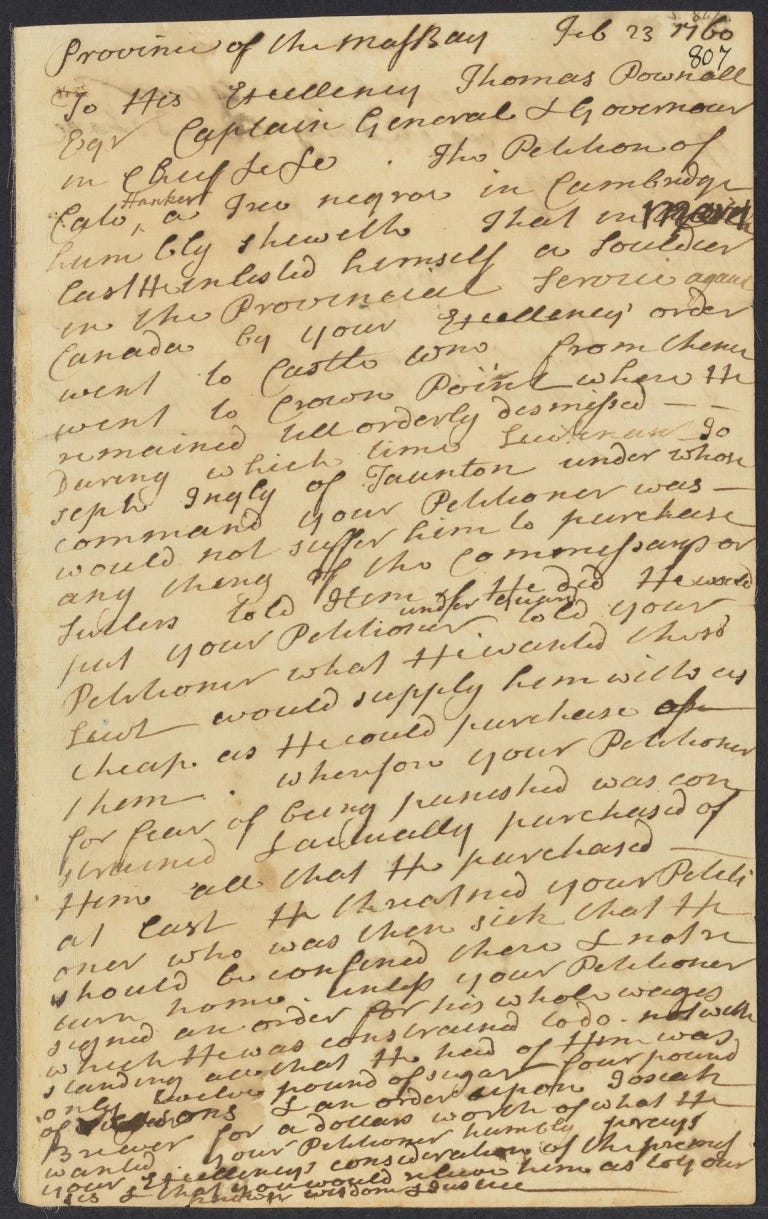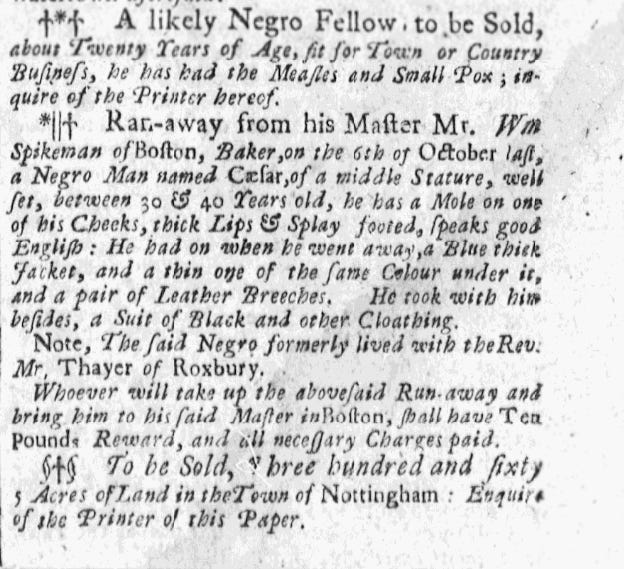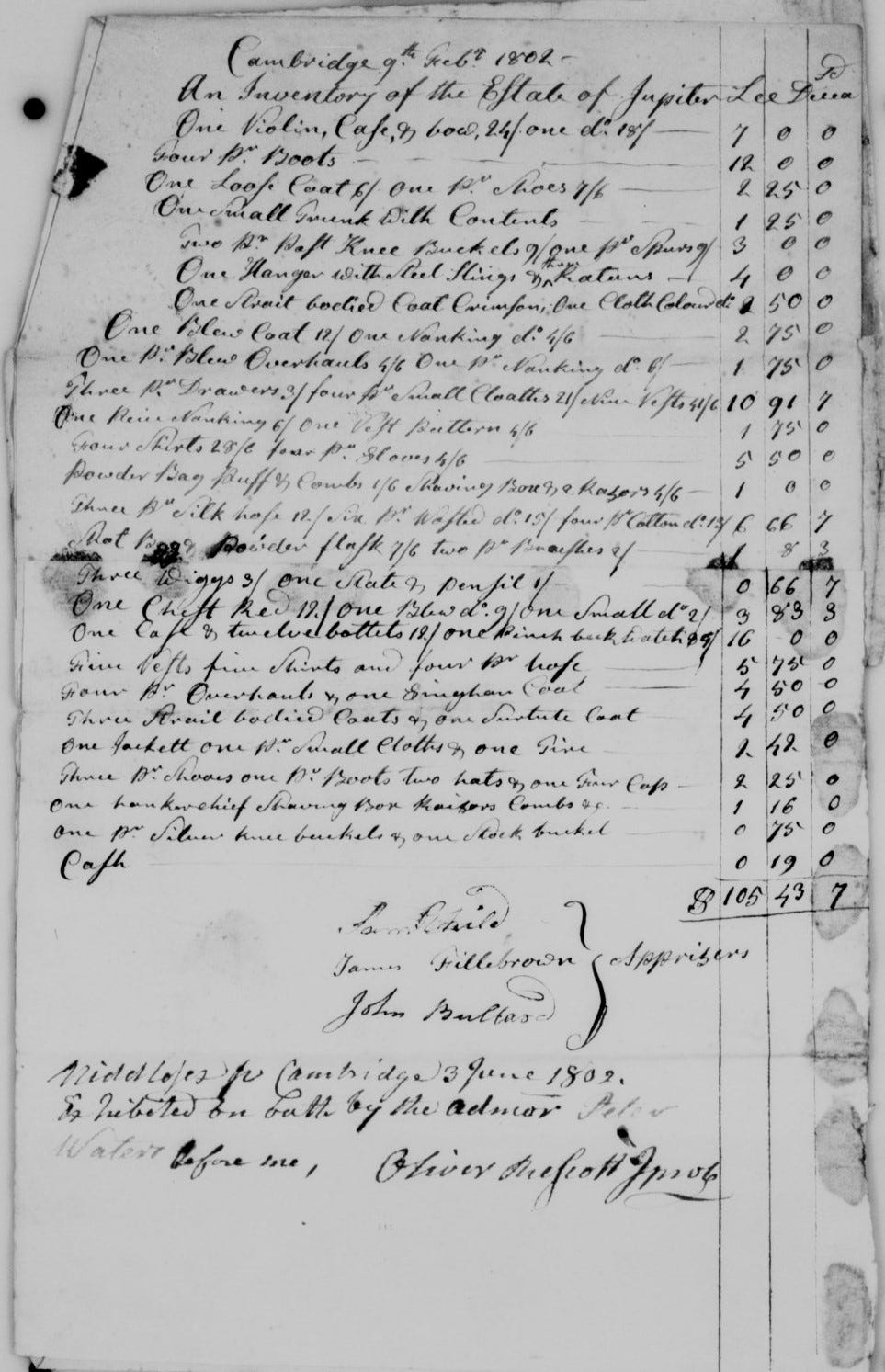November 15, 2022
Middle Passage Marker for a Plymouth Stowaway? Soldiers Cato Hanker and Jupiter Lee, plus Caesar and Rev. Ebenezer Thayer
Welcome to Open Notebook! Friends, I’ve accidentally locked myself out of Twitter. It’s been over a week, and the account may be gone for good 🤷♂️. For those still on the platform, please spread the word that I’m still around and perhaps recommend the newsletter to stay in touch? It is highly appreciated when you help spread the word about the Eleven Names Project and this newsletter.
Plymouth Middle Passage Marker for Barbados Stowaway?
Could the story of Charles bring a Middle Passage Port Marker to Plymouth? Leave your thoughts in the comments below. (i.e. Tell me that I’m not crazy.)
January 1742: John Coshat/Corhatt, a minor of Plymouth and a mariner, along with Scipeo, a negro “slave” belonging to Capt John Pickard, while visiting Carlisle Bay, Barbados, "did take and conceal on board the sloop Molly...a...negro man called Charles", held in slavery by Benjamin Bissett. Scipio and Coshat hid Charles on Commander Elkanah Cushman's ship until they reached Plymouth and then further concealed Charles for fourteen more days.
The jurors found that Scipeo and Coshat were "guilty of feloniously stealing away, harboring, and concealing...Charles, the servant and property" of Bissett. The court ordered the defendants to pay a £5 fine and £15.17s.6d costs of prosecution and to "stand committed until paid.”
Although Scipeo is noted as negro, John Coshat’s racial identity is unclear. He might be English, but I wonder if his unusual last name and alignment with two enslaved men indicate Coshat is of Wampanoag heritage.
This is an impressive “mutual aid” story and would make a better novel than The Adventures of Huckleberry Finn.

Primary Source: Cato Hanker
Cato Hanker (sometimes also called Kata Hunker) was born in Africa ca. 1718. In 1724, at the young age of 6, Hanker was kidnapped from Africa and taken to Boston…During the French and Indian war, Hanker enlisted in the army, serving from 1757-1763 at sites like Castle Williams, Ticonderoga, and Crown Point. During this period of service, Hanker was impressed to sign over all of his wages to his commanding officer. In response, Hanker filed a petition for justice with Thomas Pownall, Governor of the Province of Massachusetts Bay, in 1760.
Hanker further served in the War of Independence.
The above quote is from a compelling biographical sketch of Hanker written by Stacen Goldman. The sketch is one of 33 similar sketches of Framingham’s enslaved population in support of Framingham History Center’s striking digital exhibition of Bill of Sale for Phebey, Enslaved Child 1764.
Here is Cato Hanker’s 1760 petition:

“Pheby” is 1/10 of Goldman’s gem of a digital exhibition Framingham’s Top Ten. For a complete dossier of documents attesting to Hanker’s life, visit eleven-names.com.
Probate File of the Week: Jupiter Lee
Jupiter Lee enlisted in the Revolution for the town of Hardwick, Massachusetts, in 1781 as a three-years man. A December 1782 quartermaster’s payroll from West Point, New York, indicates Lee was a fatigueman, a soldier often charged with laborious tasks of ditch-digging, fortification building, road maintenance, and the other manual labor associated with moving earth. Lee, whose freedom status is unknown at the time of enlistment, appears to be an ancestor of the Lee family found throughout records in Scituate/Norwell. A Jupiter Lee is listed as Alice Brooker’s father on her First Parish Cemetery headstone. Alice’s son George Lee was a border with Norwell abolitionist Venus Manning, and George’s son Benjamin Franklin Lee was a veteran of the 54th Massachusetts Infantry. Both men appeared in Manning’s will, and the Lee family lived in the Norwell/Hanover area (at least) into the early twentieth century. George Lee owned property in Norwell partly due to a legacy from Manning. Sadly, Benjamin and his niece perished in a 1909 Hanover fire.
Jupiter died intestate, and his will does not confirm that his Alice’s father. But his probate inventory is a keyhole view into his life. Notably, Jupiter appears to be a musician, as the first item listed is “one violin, case, bow….” Tavern musician was a decent job for unpropertied Black men during this era.
If you look at Revolutionary records, note with interest that another Jupiter Lee mustered with the militia for Rehoboth. That Jupiter plays a supporting role in the story of a Massachusetts woman who brought a fascinating freedom suit to the Supreme Court of New Jersey. Look for that story in a future newsletter.
Enslaving Minister of the Week: Rev. Ebenezer Thayer
Rev. Ebenezer Thayer (d. 1733) was the first minister of the Second Parish Church of Roxbury, Massachusetts. This church serviced people living in the Roxbury neighborhoods that became Roslindale, West Roxbury, and Jamaica Plain.
Although the church no longer stands and the Universalist and United Church of Christ congregations that claim this parish as their mother church are not located near the original church grounds, you may be familiar with the relics of Thayer’s parish. Visitors to the Roslindale/Peter’s Hill side of the Arnold Arboretum know that a colonial graveyard exists adjacent to Walter St. This was the burying ground attached to the meetinghouse.
Thayer’s successor was the Rev. Nathaniel Walter (hence Walter Street), and on a Revolutionary-era map, we find this map listed as “Mr. Walter’s Meetinghouse.”
We can compare Rev. Thayer’s March 1733 probate inventory with the below October 1733 runaway ad and conclude that the “one negro man” valued at £95 is the same “Caesar, of middle stature, well set” who spoke “good English” and was wearing at his departure a “Blue thick Jacket, and a thin one of the same Colour under it, and a pair of Leather Breeches.” While Caesar’s ultimate fate is unknown, this ad was repeated in December indicating that Caesar may have savored a few weeks away from William Spikeman’s bakery.

Podcast Reccomendation
This week’s recommendation is HUB History’s Mutiny on the Rising Sun, with Dr. Jared Ross Hardesty (episode 234).
This week, Jake interviews Dr. Jared Ross Hardesty, author of the new book Mutiny on the Rising Sun: a tragic tale of smuggling, slavery, and chocolate, which uncovers the dark web of interconnections between Old North Church, chocolate, and chattel slavery. Dr. Hardesty will explain why a reputable sea captain would become a smuggler, trafficking in illegal chocolate and enslaved Africans; the risks an 18th century Bostonian would take to provide himself with a competence, or enough money to allow his family to live independently; and what it meant in that era to be of but not from Boston. At the heart of the story is a brutal murder and mutiny on the high seas, illustrating the fundamental brutality of life in the 18th century, but the role of the church (specifically Old North Church) in the social and economic lives of Bostonians is also central to understanding the life and death of Captain Newark Jackson.
Essential Links
The Transatlantic Slave Trade, a report from the Equal Justice initiative
The Transatlantic Slave Trade and Connecticut: A brutal history to carry as as ‘we think about new challenges and new issues.’, Hartford Courant


